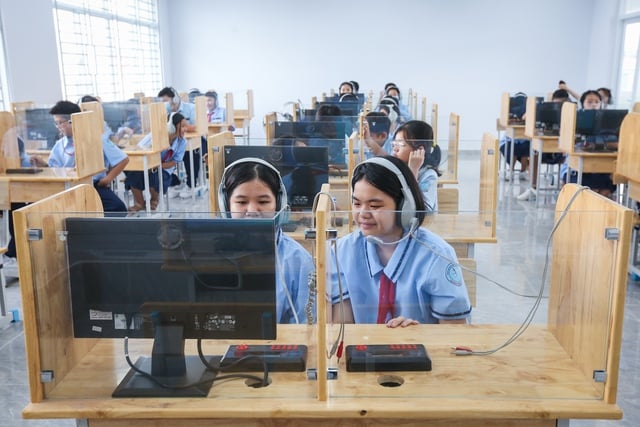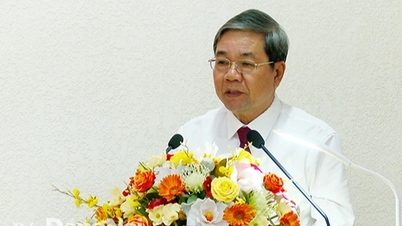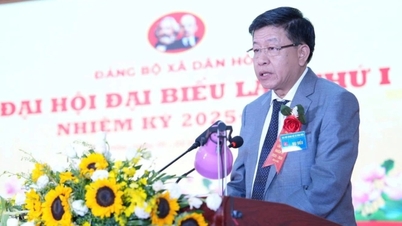FOCUS ON TEACHERS AND TEXTBOOKS
Associate Professor Dr. Hadina Habil, President of the Institute of Languages at the University of Technology, Malaysia (UTM), agrees with the policy of making English the second language in Vietnamese high schools, as this is the first step to implementing English as the second language nationwide. At the grassroots level, Ms. Hadina emphasized that the government needs to invest in and support the teaching staff, and should not let teachers "swim on their own", especially in subjects other than English.

Malaysia is promoting itself as a “transition” destination before studying abroad in traditional English-speaking countries such as Australia and the UK, attracting 740 Vietnamese students by 2023 thanks to its affordable costs and popular English-speaking environment.
PHOTO: NGOC LONG
Learning materials, including textbooks, are also an issue that has been mentioned. Specifically, learning materials used in English classes must be localized, that is, they must include examples close to Vietnamese culture such as traditional festivals, instead of keeping the content of foreign books after purchasing copyrights. Currently, textbooks for the new program in Vietnam are copyrighted by Pearson Group and Oxford University Press, both from the UK.
Sharing more about the story of Vietnamese textbooks, Dr. Nguyen Dang Nguyen, Head of the English Literature Department, University of Social Sciences and Humanities (Ho Chi Minh City National University), said that the old curriculum textbooks were "forced, rigid, and only used for testing" but this shortcoming has been overcome in the new curriculum books.
"However, textbooks are only one factor. At a higher level, local Departments of Education and Training and the Ministry of Education and Training need to have a training program for teachers on teaching methods, effective use of textbooks, as well as English proficiency and cultural knowledge to realize the proposed policy," Dr. Nguyen proposed.
DEVELOPING INTERNATIONAL STANDARDIZED TEST
Dr. Abdullah bin Mohd Nawi, a senior lecturer at the University of Technology, Malaysia and CEO of a company specializing in communication skills training, stressed the importance of designing an English test aligned with the Common European Framework of Reference for Languages (CEFR) for native speakers. This is what Malaysia did when it introduced the Malaysian University English Test (MUET) more than 20 years ago.
As one of the participants in developing this test, Dr. Abdullah said that the Malaysian Examinations Council had to cooperate with Cambridge English and it took 3 years to complete, costing millions of ringgit (1 ringgit is equivalent to about 5,600 VND) to complete. Up to now, besides all domestic universities, MUET is recognized by many universities around the world as an alternative to IELTS and this number is still increasing, according to Mr. Abdullah.
"According to current regulations, Malaysian primary school teachers must meet CEFR C1 level and we are applying all measures to achieve this first, including financial factors. Because, teachers can take the MUET exam to prove their capacity at an affordable price without having to take other expensive exams like IELTS. That is also the reason why Vietnam should develop its own tools to avoid dependence on foreign countries," he said.

An English lesson of students in Ho Chi Minh City
PHOTO: NHAT THINH
Dr. Abdullah said that Vietnam can apply CEFR to other educational activities besides testing, such as considering it as a standard in teaching and learning, supporting teacher training, compiling educational programs..., thereby connecting Vietnam's education with other countries that also apply CEFR. "This helps us easily compare and recognize the English proficiency of learners globally because we have the same assessment standards, opening up many opportunities for international study and work," Mr. Abdullah commented.
SOCIAL ATTENTION AND SUPPORT
Dr. Abdullah bin Mohd Nawi said that to make English a second language, Vietnam needs to solve many different problems, not just limited to schools. One of them is the need for attention and support from society, and to make people understand the importance of using English. At the same time, Vietnam needs to pay attention to the differences in levels and learning environments between regions. "Like in rural Malaysia, English is almost a foreign language rather than a second language," Mr. Abdullah noted.
Source: https://thanhnien.vn/dua-tieng-anh-la-ngon-ngu-thu-hai-trong-truong-hoc-kinh-nghiem-tu-truong-hop-malaysia-185240908195003172.htm



![[Photo] Da Nang: Hundreds of people join hands to clean up a vital tourist route after storm No. 13](https://vphoto.vietnam.vn/thumb/1200x675/vietnam/resource/IMAGE/2025/11/07/1762491638903_image-3-1353-jpg.webp)











































































































Comment (0)